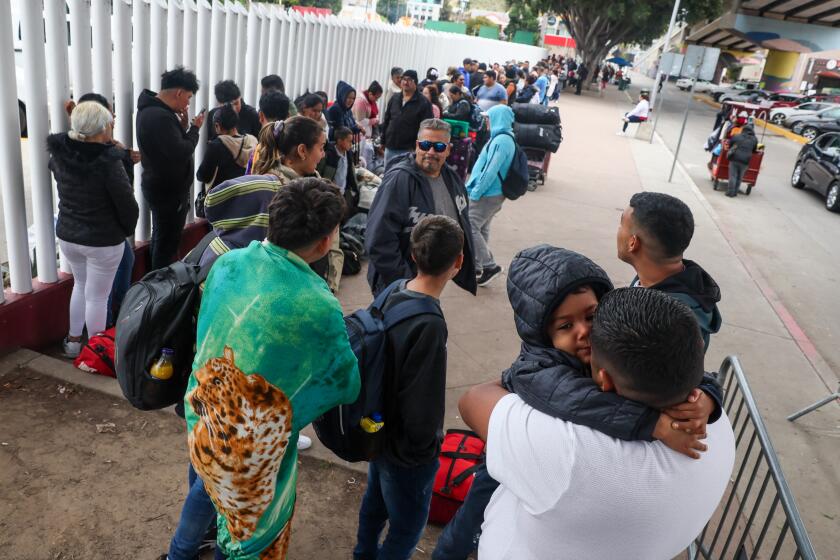Thai Boy Gets OK to Stay in U.S. for Now
U.S. Atty. Gen. John Ashcroft on Monday granted temporary residency status to a 4-year-old Thai boy who was used as cover in a human smuggling operation.
The Immigration and Naturalization Service, part of Ashcroft’s Justice Department, had denied the boy political asylum. The agency originally sought to deport the child, who is HIV positive, to Thailand, where his grandparents have won legal custody.
Los Angeles-based advocates for the boy, Phanupong Khaisri, known as Got, have argued that the grandparents are unsuitable guardians and that he could face being forced back into the realm of human traffickers if returned to his homeland. They won a federal court ruling in June that allowed the boy to stay in the U.S. to fight deportation.
Ashcroft on Monday went further, granting the boy temporary residency on humanitarian grounds. In doing so, he signaled a shift in the government’s position in a case that has focused international attention on the widespread phenomenon of human trafficking.
“Like so many victims of human trafficking, Got is a confused and isolated figure adrift in a complex legal system,” Ashcroft said at a Los Angeles news conference. “Stories like Got’s can’t help but move us.”
In addition, Ashcroft ordered the INS to adjudicate the boy’s application for a visa under a new law passed by Congress last year to aid people caught up in human trafficking. Federal authorities are still working on guidelines to implement the law, the Human Trafficking Victims Protection Act.
The nation’s chief law enforcement officer acknowledged that a parent was normally “the appropriate person to represent a child.” But he noted that the boy’s father is dead, and that his mother--a convicted prostitute who “rented” him to traffickers--has relinquished her parental rights. Ashcroft said the boy’s paternal grandmother, who is seeking his return, is a convicted heroin trafficker.
Before making his public statement, Ashcroft met privately with the boy, his guardians and attorney. The attorney general’s unusual personal involvement underscores both the broad publicity surrounding the case and, Ashcroft said, his commitment to fighting such smuggling.
The case has sometimes been likened to the explosive case of Elian Gonzalez, the Cuban boy who was returned to his father in Cuba last year amid fierce protests by the Cuban American community. In that case, Clinton administration officials decided that the boy’s father was the appropriate guardian.
Despite Monday’s dramatic turns, the ultimate fate of Phanupong remains unclear. Two members of the Los Angeles-based Thai Community Development Center have been appointed his guardians. Although his health has improved and he is attending preschool, Phanupong still does not have the legal right to remain permanently in the United States.
“This is in essence a temporary holding position announced today by the attorney general,” said Peter Schey, the boy’s attorney.
Within days, Schey said, he plans to file a class-action lawsuit seeking to force the INS to improve its treatment of more than 4,000 unaccompanied minors taken into custody each year. The suit would seek to ensure proper legal representation and minimal detention for the children.
Dorothea Kraeger, a Phoenix-based attorney for the grandparents, called the attorney general’s ruling a setback. But she said the pair would continue their legal fight to bring the boy home, opposing efforts of advocates here to win permanent resident status and fighting the plans of a Silver Lake couple to adopt him.
“The grandparents really love that little boy,” Kraeger said of the Thai couple, who have been in Los Angeles following the case for the last six weeks. “This is not the end of the story.”
The case has become a cause celebre in the legal battle against human trafficking, which law enforcement authorities say annually ensnares as many as 2 million women and children to work in the sex industry or as forced laborers. As many as 50,000 are smuggled into the United States each year and forced to toil in sweatshops, fields, strip clubs, brothels and other sites, according to government officials.
Phanupong arrived at Los Angeles International Airport in April 2000, with two adults who, authorities say, were using him as a decoy to smuggle a woman into the country. The adults were expelled to Thailand, but immigration officials were unsure what to do with Phanupong, who was then 2 and obviously physically ailing.
Ashcroft also delivered a pep talk Monday to several hundred employees of the U.S. attorney’s office in Los Angeles, expressing appreciation for their hard work and reasserting the administration’s goal of cracking down on criminals who use a gun and on narcotics peddlers.
Ashcroft also confirmed that while in Los Angeles, he planned to meet privately with a screening committee that is interviewing candidates for the job of U.S. attorney in Los Angeles.
U.S. attorneys are political appointees, chosen by the president and approved by the Senate. John S. Gordon, a career prosecutor, has served as interim U.S. attorney since the resignation in April of Clinton appointee Alejandro N. Mayorkas.
Later Monday, Ashcroft traveled to San Diego and began a two-day tour of the U.S.-Mexico border in California and Arizona, greeting a class of 32 newly trained Border Patrol agents. The guards will be assigned to a special search and rescue team to assist illegal border-crossers who run into danger in hazardous areas. Washington plans to extend Border Patrol rescue teams across the U.S.-Mexico border, authorities said.
Times staff writers Ken Ellingwood and David Rosenzweig contributed to this story.
More to Read
Start your day right
Sign up for Essential California for news, features and recommendations from the L.A. Times and beyond in your inbox six days a week.
You may occasionally receive promotional content from the Los Angeles Times.






